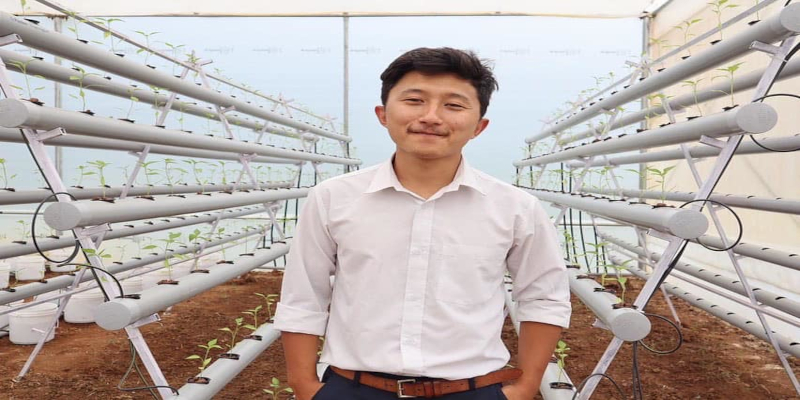Dharamshala, 2nd October: Nyima Dakpa(Founder of Zomphel) has always been interested in entrepreneurship and has always preferred to work for himself rather than for others. With his buddies, he felt out of the ordinary. His viewpoints appear to be very different from those of his peers. He used to work on science projects and experiments with zeal while he was a student. If he is interested in something, he pursues it with zeal. He learned about hydroponic farming from a friend a long time ago and immediately grew interest in it. Nyima Dakpa was born in Bylakuppe and attended CST Bylakuppe till the tenth grade. He studied science in high school and attended CST Mussoorie. He earned his bachelor’s degree in engineering from Bengaluru’s Raja Rajeshwari College of engineering.
Following his engineering graduation, he worked in product development for a year. When he was at the company, he was working on a project. He proposed hydroponic farming and his company became interested in the proposal, and he began working on it. The corporation did not adequately fund him for the endeavor, and he was dissatisfied. The financing is halted since the project requires extensive research and is time demanding. He lost interest and motivation in his career after a year. As a result, he quit his job and founded “Zomphel,” a new company. He took the project with him when he left. He had always wished to put his newly acquired knowledge and abilities to good use in his community.
Because his parents were farmers and didn’t have much money, he encountered financial challenges when creating Zomphel. But, thanks to The Department of Home(CTA), USAID, and The Tibet Fund, Zomphel was able to receive some funding. He had to give up his work in order to create Zomphel. His parents, brother, relatives, partner, and friends were very supportive.
The name “Zomphel” is derived from his family name. It is based in the Tibetan settlement of Bylakuppe. Nyima’s Zomphel establishes itself as Tibet’s first hydroponic firm. It’s been over three years since Zomphel was founded. There are two subbrands in Zomphel: one is named Zomphel Agritech, and the other is Zomphel eShop. The eShop serves as a platform for the settlement’s items to be shipped to various parts of the globe. This also aids the growth of other local businesses. The Zomphel eShop ships incense, chilies, thangka paintings, and other items. Since its inception six months ago, e-commerce has dispatched over 600 parcels around the world.
Zomphel Agritech was founded with the mission of producing high-quality, nutritional, and flavourful vegetables by implementing modern farming techniques for growing plants. The company aims to preserve natural resources through less water consumption, zero pesticides and herbicides, and more vegetables for the same amount of space as traditional farming. They are a team of Next Generation farmers, researchers, and engineers who work together to provide the world with the best vegetables using minimum water and no pesticides.
He’s overjoyed because he’s created something larger than himself. Even while his name isn’t well-known, his company, ‘Zomphel,’ is. He believes his company is only getting started and sees a lot of promise in the future. He said, “Zomphel has evolved into far more than I had anticipated.” He wants to start a franchise.
He claims that while the nutrient’s raw elements are supplied from outside, the recipe is his own innovation and a well-kept secret. Nyima has planted two crops on his farm: bokchoy and dole chilies. As of now, services like vegetable-at-your-doorsteps are only accessible in Bylakuppe. The farm is fully automated, and he manages it from his phone. Because all of the important data, such as humidity, temperature, and moisture, are updated on his phone, he can travel anywhere. Although hydroponic crops are deemed organic in the United States, they are not in India.
“Hydroponic farming is the future of farming,” he stated in an exclusive interview with Tibetanjournal. “You can do vertical farming and save up to 80% on water. The initial investment is substantially higher than traditional farming, but the long-term costs are much lower.”
“Both Agritech and the eShop have a promising future. In India, there are very few hydroponic enterprises, but there is a lot of room for growth. When it comes to eShop, more and more individuals are choosing to shop online. It will also serve as a link between Tibetans living outside and inside India” he added in that interview.
Link to Zomphel website: Zomphel.com
Link to Zomphel eShop: https://shop.zomphel.com

